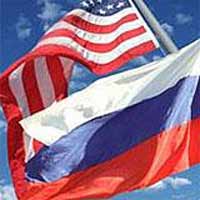Russia may hit USA very hard below the belt
US leading experts analyzed punishing opportunities of both Russia and the West after the recent armed conflict in Georgia. Specialists came to conclusion that the list of potential Western sanctions pales in comparison with what Moscow could do in response. However, the US administration hopes that Russia will not resort to radical measures not to harm its own financial and security interests.

The US administration has issued yet another warning to Moscow recently claiming that Russia’s actions in Georgia would question the future of its WTO bid, as well as Russia’s position in the Group of Eight.
The list of Washington’s threats also includes the blocking of Russia’s membership in the Organization for Economic Cooperation and Development, the boycott of Russia’s hosting of Winter Olympics in 2014 and a freeze of US-Russian strategic dialogue.
US experts warn that the list of Moscow’s potential sanctions is a lot longer. Angela Stent, the director of the Center for Eurasian, Russian and East European Studies, Georgetown University, said that Moscow may respond at the UN Security Council, where it can put obstacles on the way of US intentions to punish Iran for its nuclear ambition. All anti-terrorist programs, the struggle against drug mafia, Syria, Venezuela and Hamas can be added on the list too. There are many questions, on which Russians may stop their cooperation with the USA, with the cooperation in the energy industry on top of that list, the expert believes.
The International Herald Tribune wrote with reference to US outstanding analysts that Washington needed a lot more from Moscow than vice versa. The US needs to ensure the security of Soviet nuclear weapons, to obtain Russia’s help in the endeavor to make Iran and North Korea shut down their nuclear programs.
The sale of Russia’s arms is another problem. The governments of Western countries and Israel are concerned about reports saying that Russia started the shipments of first components of its S-300 missile system to Iran. The latter may subsequently use the powerful systems to down US and Israeli aircraft.
Russia may complicate USA’s and NATO’s supply of the coalition in Afghanistan In April, Moscow gave France and Germany a right to transit non-combatant cargoes via Russia. Russia’s ambassador to NATO, Dmitry Rogozin, said that the West should not bite the hand that feeds 50,000 servicemen in Afghanistan. Moscow can offer show pressure of Kyrgyzstan and Uzbekistan, which the USA would like to use for their operations in Afghanistan.
In addition, Russia is capable of blocking any sanctions at the UN Security Council. Moscow can also pull out from a number of disarmament treaties, including the one signed with the USA about the liquidation of short and smaller range missiles after the expiry of START-1 Treaty in 2009.
Flynt Leverett, a former National Security Council senior director and CIA senior analyst, said that Moscow was becoming a very important buyer of US Treasury bonds and US government agency issues. The specialist believes that those officials, who urge Washington to put forward various ultimatums to Russia, would hardly prefer Moscow disposing of its dollar assets. Leverett wrote for The National Interest that Moscow was sounding out opportunities of selling Russian crude for roubles, which would obviously affect long-term dollar positions.
Washington hopes that Russia will not go too far. For example, Iran’s possession of nuclear weapons and the abrupt devaluation of Russian dollar assets would be highly undesirable for Russia as well. However, Moscow’s further actions will depend on new sanctions of the West that will have to think twice before reacting to possible recognition of South Ossetia’s and Abkhazia’s independence by Russia.
Subscribe to Pravda.Ru Telegram channel, Facebook, RSS!





